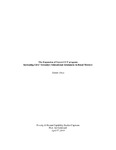The Expansion of Tayssir CCT Program: Increasing Girls' Secondary Educational Attainment in Rural Morocco

View/
Author
Abiza, Zainab
Subject
Washington and Lee University, Shepherd Poverty Program
Morocco
Education, Secondary
Daughters
Incentive (Psychology)
Metadata
Show full item recordDescription
Capstone; [FULL-TEXT RESTRICTED TO WASHINGTON AND LEE UNIVERSITY LOGIN] Zainab Abiza is a member of the Class of 2019 of Washington and Lee University. This paper examines ways in which the conditional cash transfer program Tayssir can help increase girls' secondary school attainment in rural areas of Morocco. Currently, the Tayssir program only targets children at the primary school level. I propose the expansion of the Tayssir program to the secondary school level with a specific targeting of girls. Throughout the paper, I examine the various social and family structures in rural Morocco and how they affect girls' ability to enroll in secondary school if the program was to be expanded. First, I will review existing economic and anthropology literature that looks at the effect of cash transfers on school enrollment and attendance, marriage and fertility, and cognitive achievements measured through test scores. Next, using the budget constraint model, I will explain why low-income households might choose to not invest or underinvest in their daughter's education. Using the same model, I will show how the cash transfers loosen up the budget constraint faced by low-income households through decreasing the cost of education. However, the cash incentive is not always enough: lower costs of education do not always translate into higher investment in girls' education, especially at the secondary school level. I will use economic graphs to explain this market failure and demonstrate how the household's willingness to invest in their daughter's education depends on various cultural and societal factors including patriarchy, the seclusion of women, early marriage and family structure. I will also include anecdotal stories of rural Moroccan girls, many of whom I worked with this summer, to highlight some of the barriers they faced in accessing secondary school education. Following the analysis, I will include a discussion of the ethical implications of the cash transfer programs. More specifically, I will look at whether the CCT programs are culturally imperialistic and whether they violate household's autonomy as well as Islamic beliefs and values. The last section of the paper will conclude and present policy recommendations. [From Methodology] Zainab Abiza